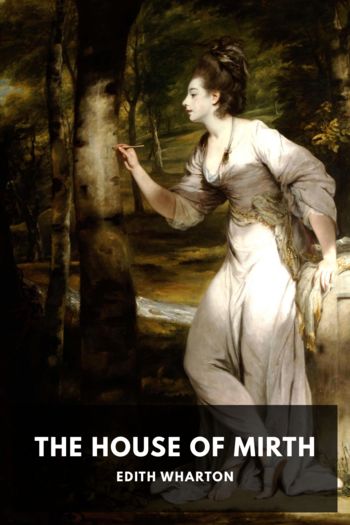The House of Mirth - Edith Wharton (phonics reader .txt) 📗

- Author: Edith Wharton
Book online «The House of Mirth - Edith Wharton (phonics reader .txt) 📗». Author Edith Wharton
“Sorry, Gus—I can’t do it.”
As Selden turned away, he noticed the dark flush on Trenor’s face, the unpleasant moisture of his intensely white forehead, the way his jewelled rings were wedged in the creases of his fat red fingers. Certainly the beast was predominating—the beast at the bottom of the glass. And he had heard this man’s name coupled with Lily’s! Bah—the thought sickened him; all the way back to his rooms he was haunted by the sight of Trenor’s fat creased hands—
On his table lay the note: Lily had sent it to his rooms. He knew what was in it before he broke the seal—a grey seal with “Beyond!” beneath a flying ship. Ah, he would take her beyond—beyond the ugliness, the pettiness, the attrition and corrosion of the soul—
Gerty’s little sitting-room sparkled with welcome when Selden entered it. Its modest “effects,” compact of enamel paint and ingenuity, spoke to him in the language just then sweetest to his ear. It is surprising how little narrow walls and a low ceiling matter, when the roof of the soul has suddenly been raised. Gerty sparkled too; or at least shone with a tempered radiance. He had never before noticed that she had “points”—really, some good fellow might do worse … Over the little dinner (and here, again, the effects were wonderful) he told her she ought to marry—he was in a mood to pair off the whole world. She had made the caramel custard with her own hands? It was sinful to keep such gifts to herself. He reflected with a throb of pride that Lily could trim her own hats—she had told him so the day of their walk at Bellomont.
He did not speak of Lily till after dinner. During the little repast he kept the talk on his hostess, who, fluttered at being the centre of observation, shone as rosy as the candle-shades she had manufactured for the occasion. Selden evinced an extraordinary interest in her household arrangements: complimented her on the ingenuity with which she had utilized every inch of her small quarters, asked how her servant managed about afternoons out, learned that one may improvise delicious dinners in a chafing-dish, and uttered thoughtful generalizations on the burden of a large establishment.
When they were in the sitting-room again, where they fitted as snugly as bits in a puzzle, and she had brewed the coffee, and poured it into her grandmother’s eggshell cups, his eye, as he leaned back, basking in the warm fragrance, lighted on a recent photograph of Miss Bart, and the desired transition was effected without an effort. The photograph was well enough—but to catch her as she had looked last night! Gerty agreed with him—never had she been so radiant. But could photography capture that light? There had been a new look in her face—something different; yes, Selden agreed there had been something different. The coffee was so exquisite that he asked for a second cup: such a contrast to the watery stuff at the club! Ah, your poor bachelor with his impersonal club fare, alternating with the equally impersonal cuisine of the dinner-party! A man who lived in lodgings missed the best part of life—he pictured the flavourless solitude of Trenor’s repast, and felt a moment’s compassion for the man … But to return to Lily—and again and again he returned, questioning, conjecturing, leading Gerty on, draining her inmost thoughts of their stored tenderness for her friend.
At first she poured herself out unstintingly, happy in this perfect communion of their sympathies. His understanding of Lily helped to confirm her own belief in her friend. They dwelt together on the fact that Lily had had no chance. Gerty instanced her generous impulses—her restlessness and discontent. The fact that her life had never satisfied her proved that she was made for better things. She might have married more than once—the conventional rich marriage which she had been taught to consider the sole end of existence—but when the opportunity came she had always shrunk from it. Percy Gryce, for instance, had been in love with her—everyone at Bellomont had supposed them to be engaged, and her dismissal of him was thought inexplicable. This view of the Gryce incident chimed too well with Selden’s mood not to be instantly adopted by him, with a flash of retrospective contempt for what had once seemed the obvious solution. If rejection there had been—and he wondered now that he had ever doubted it!—then he held the key to the secret, and the hillsides of Bellomont were lit up, not with sunset, but with dawn. It was he who had wavered and disowned the face of opportunity—and the joy now warming his breast might have been a familiar inmate if he had captured it in its first flight.
It was at this point, perhaps, that a joy just trying its wings in Gerty’s heart dropped to earth and lay still. She sat facing Selden, repeating mechanically: “No, she has never been understood—” and all the while she herself seemed to be sitting in the centre of a great glare of comprehension. The little confidential room, where a moment ago their thoughts had touched elbows like their chairs, grew to unfriendly vastness, separating her from Selden by all the length of her new vision of the future—and that future stretched out interminably, with her lonely figure toiling down it, a mere speck on the solitude.
“She is herself with a few people only; and you are one of them,” she heard Selden saying. And again: “Be good to her, Gerty, won’t you?” and: “She has it in her to become whatever she is believed to be—you’ll help her by believing the best





Comments (0)